Against the background of increasingly severe global health challenges and disease threats, translational medicine becomes the only way leading to medical development in the 21st century. On May 27th, the Chinese-French Forum on Translational Medicine and Precision Diagnosis grandly opened at Ruijin Hospital affiliated to SJTUSM to promote the international collaboration and exchanges of translational medicine and precision diagnosis between China and France, while building a platform for cooperation in medical science innovation. The Forum was jointly sponsored by Chinese Academy of Engineering, Chinese Academy of Medical Sciences, Shanghai Jiao Tong University, and the National Academy of Medicine of France.
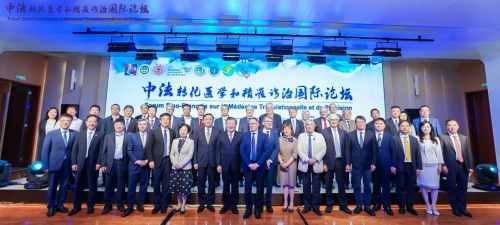
The themes of the forum are public health, cancer and aging, neurology and hematology. Experts and scholars attending the forum focused on the common challenges faced by human beings in the field of medical health. They shared thoughts and exchanged experiences with the hope of benefiting patients with innovative results of translational medicine and precise diagnosis. Their efforts will also contribute to the construction of Healthy China and Healthy Shanghai, while building a community of common health.
Chen Zhu, Chinese Chairman of the Forum, Academician of the Chinese Academy of Sciences, President of the Red Cross Society of China; Hua Yuan, Deputy Mayor of Shanghai; Gu Jinhui, Deputy Director of the Department of Scientific and Technological Education of NHC; Wang Chen, Vice President of the Chinese Academy of Engineering and President of the Chinese Academy of Medical Sciences; Ding Kuiling, Academician of the Chinese Academy of Sciences and President of SJTU; Fan Xianqun, Academician of the Chinese Academy of Engineering, Vice President of SJTU, and Chancellor of SJTUSM; Ning Guang, Academician of the Chinese Academy of Engineering and President of Ruijin Hospital affiliated to SJTUSM; Joan VALADOU, French Consul General in Shanghai; Jean-Pierre GOULLÉ, French Chairman of the Forum and Chairman of the National Academy of Medicine of France, attended the opening ceremony of the Forum with other leaders from different countries. Other attendees are renowned academicians, experts, and scholars in life sciences, clinical medicine, and translational medicine from China and France, as well as leaders, experts, and representatives of faculty and students from SJTU, SJTUSM and its affiliated hospitals.
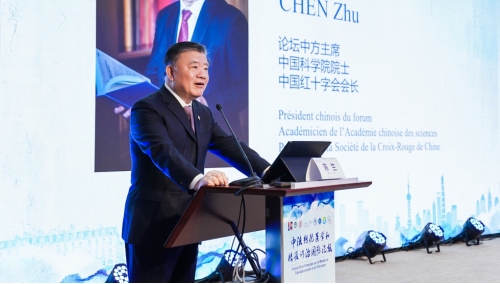
Chen Zhu, Chinese Chairman of the Forum, Academician of the Chinese Academy of Sciences, and President of the Red Cross Society of China, announced the official opening of the Chinese-French Forum on Translational Medicine and Precision Diagnosis.
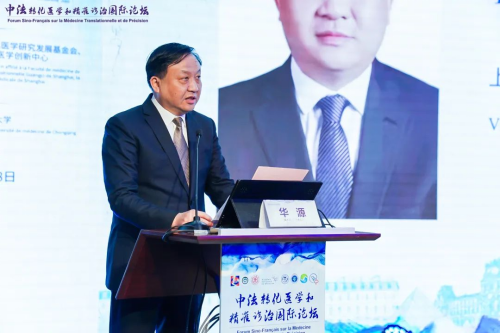
Hua Yuan, Deputy Mayor of Shanghai, declared that the exchanges between China and France have a long history. France is the first major Western country to establish formal diplomatic relations with the People's Republic of China. Over the years, cooperation and exchanges in various fields have been abundant and fruitful. Among them, the cooperation between the two countries in medical health has always been at the forefront. The cooperation centers on basic research, medical teaching, and clinical diagnosis, and continues to broaden and deepen. In April this year, President Macron visited China for the third time. Presidents of China and France agreed to take the 60th anniversary of the establishment of diplomatic ties as an opportunity to comprehensively deepen exchanges and cooperation in various fields. This is also a great opportunity for Chinese-French medical exchanges and cooperation. Nowadays, human health is facing serious challenges worldwide. Hua sincerely hopes that experts from the two countries can make use of this Forum to achieve in-depth and candid academic exchanges. This Forum will strengthen cooperation, promote the cultivation of medical talent, and realize the innovation of technology, and enhance the undertaking of the health of people worldwide.
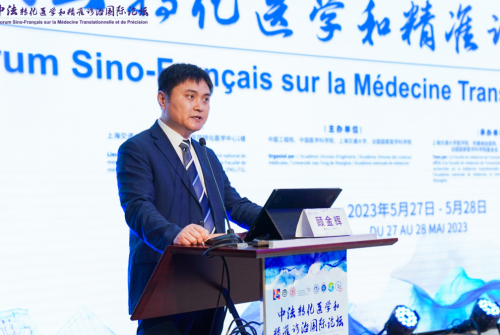
Gu Jinhui, Deputy Director of the Department of Scientific and Technological Education of NHC, declared that health is the cornerstone of human survival and development and that staying healthy is the shared aspiration of people worldwide. The “Healthy China 2030” Planning Outline issued by the Chinese government clarifies the direction of future development. The Healthy China initiative will transform from “a disease-centered medical model to a health-centered service model covering full life cycle.” This direction coincides with the concept of translational medicine and precise diagnosis. In the future, we will strengthen the research in basic medical field, and dig deeper into the etiology and mechanism of various diseases, so as to provide more research results for translational medicine. Moreover, we need to enhance the biobank and clinical database by collecting patient information and biological samples in a more comprehensive and accurate manner, so as to conduct diagnosis and treatment more precisely. In addition, we should strengthen interdisciplinary cooperation, integrate the advantages of different disciplines, and carry out systematic research and exploration to promote transformation and innovation in the medical field.
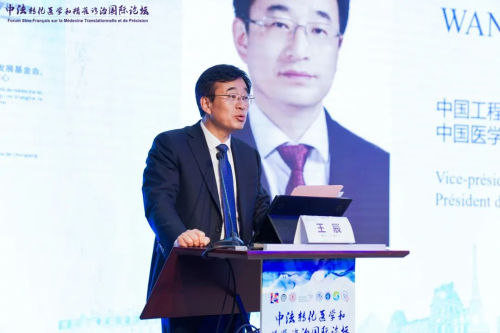
Wang Chen, Vice President of the Chinese Academy of Engineering and President of the Chinese Academy of Medical Sciences, pointed out that the world is undergoing rapid changes unseen in a century, and that the scientific and technological revolution and industrial transformation have entered a new round of deepened development. Wang also declared that human society is facing unprecedented challenges. Against this background, the Chinese-French Forum theme of “Translational Medicine and Precision Diagnosis” bears great significance. Wang said that strengthening international cooperation and jointly promoting the high-quality development of health care is the first step to adapting to these changes. Secondly, multi-disciplinary integration and reciprocity should be promoted to give fresh impetus to scientific and technological innovation. The third step is to build the concept of population medicine by centering on people's health to find a new direction for the development of precision medicine.
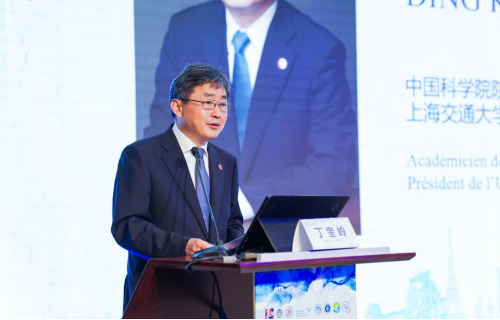
As one of the organizers of this Forum, Ding Kuiling, Academician of the Chinese Academy of Sciences and President of SJTU, declared that SJTU will unswervingly implement the strategy of openness and integration, with Shanghai as its foothold and medicine as its core. The goal is to continuously enhance SJTU’s schooling and innovation ability so that SJTU will become an attractive destination for outstanding young talent at home and abroad. SJTU will also stand out as a crucial node in the world's higher education system and the hub of the global innovation network. The world today is facing significant changes unseen in a century. The international situation is complex and the development of science and technology is evolving with each passing day. This forum helps lay a solid foundation for friendship. China and France share the goal of exploring new ideas and methods to solve medical problems. The joint efforts will make greater contributions to the development of a community of common health.
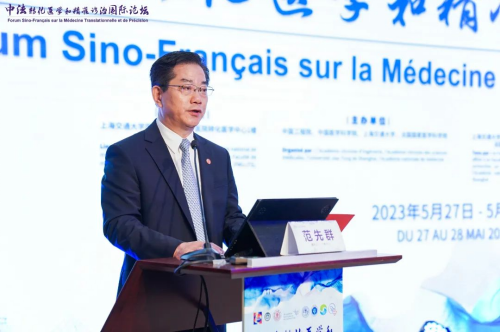
Fan Xianqun, Academician of the Chinese Academy of Engineering, Vice President of SJTU, and Chancellor of SJTUSM, declared that SJTUSM has a schooling history of 127 years and a foundation history of 71 years. Among ESI and US News discipline rankings, SJTUSM’s clinical medicine discipline ranks first in China. SJTUSM has 21 academicians and more than 200 national-level talents. SJTUSM responds to the national strategy of Healthy China by building a world-class medical school with world-class medical disciplines. Fan Xianqun said that SJTUSM plans to build an international medical education system and improve the teaching quality of courses in French. These courses will be in parallel with those in high-level universities in France. SJTUSM will develop high-quality courses in medical education to cultivate excellent medical talent with a vision at the international level. SJTUSM will build a high-level team of Chinese and French teaching staff on the cooperative platform of Chinese-French Joint Medical College. By attaching importance to the principle of “attracting talent by talented people”, SJTUSM will attract more first-class talented people worldwide and build a first-class team to bring innovative ideas. At the same time, a joint award will be set up to encourage young and middle-aged scholars who help promote Chinese-French exchanges in basic and clinical medicine. SJTUSM pays equal attention to the introduction and cultivation of talent while building a high-level Chinese-French teaching staff. SJTUSM will promote the cooperative mechanism focusing on “collaboration, innovation, and reciprocity” and integrate high-quality resources. SJTUSM, together with first-class universities in France, will explore innovative ideas about the cooperation model and expand the field of cooperation. The goal is to achieve collaboration, innovation, and reciprocity at a higher level.
Ancient buildings of French style in SJTUSM and the affiliated Ruijin Hospital have witnessed the long-standing cooperation between China and France in the fields of medical education and medical health. In 1908, Aurora University moved from Xujiahui to No. 227 South Chongqing Road and opened a medical school to train medical professionals with the teaching model from France. In 1964, after the establishment of diplomatic relations between China and France, Shanghai Second Medical University opened its first French class. After years of development, the eight-year French course for clinical medicine has become a representative of SJTUSM's cultivation of medical talented people with strong creativity. In 2018, SJTUSM established the Chinese-French Joint Medical School. In 2021, the French course for medical examination was set up. The educational cooperation between SJTUSM and first-class universities in France has been passed down for a century, bursting with innovation and creativity. Chinese-French exchanges and cooperation in medical health has become a much-told tale. SJTUSM will continue to strengthen two-way cooperation and exchanges in medicine, teaching, and research with first-class universities in France to jointly promote the development of medical science and medical education.
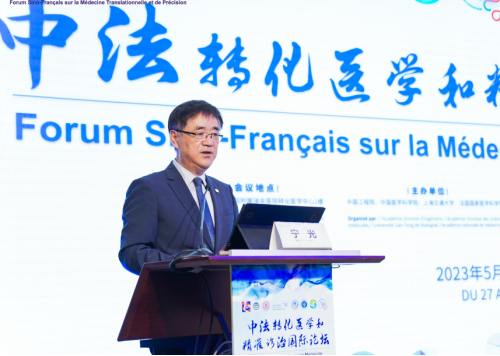
On behalf of the medical staff, Ning Guang, Academician of the Chinese Academy of Engineering and President of Ruijin Hospital affiliated to SJTUSM, expressed his most sincere welcome to the academicians and experts participating in the Chinese-French Forum on Translational Medicine and Precision Diagnosis. He said that China’s friendship with France was built more than a century ago. This relationship gave a special charm to Ruijin Hospital in the medical industry in Shanghai, and even in China. Most of the doctors and nurses in Ruijin Hospital have received medical education in French, and many scholars have attended top academic institutions in France. In 2020, we donated prevention supplies to Auvergne-Rhône-Alpes and Assistance Publique-Ho spitaux de Paris. In 2022, the Consulate of France in Shanghai guided French-funded companies through making donations to Ruijin Hospital. We cherish the ties deeply as the driving force for future in-depth exchanges and cooperation with medical peers in France. Experts from China and France will take this forum as an opportunity to contribute their wisdom to tackling medical problems and improving the health and well-being of people worldwide. SJTUSM and its affiliated hospitals will continue to strengthen two-way cooperation and exchanges in medicine, teaching, and research with first-class universities in France to jointly promote the development of medical science and medical education.
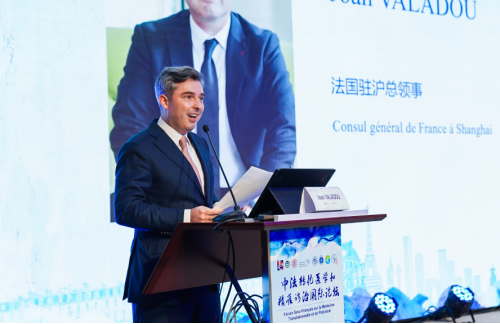
On behalf of the French government, Joan VALADOU, Consul General of France in Shanghai, congratulated the opening of the Chinese-French Forum. He said that health is one of the main topics of regular talks between the Presidents of China and France. The field of health has long been a key cooperation area of Chinese-French partnership. Health is also one of the bilateral cooperation fields facing the future. This Forum focuses on translational medicine, aiming to transform scientific theories and experimental discoveries into specific applications to meet more needs in medical and pharmaceutical aspects. Joan VALADOU pointed out that the Chinese-French Joint Medical School of SJTUSM is the flagship project of bilateral cooperation and it will lay a solid foundation for the development of new ideas.
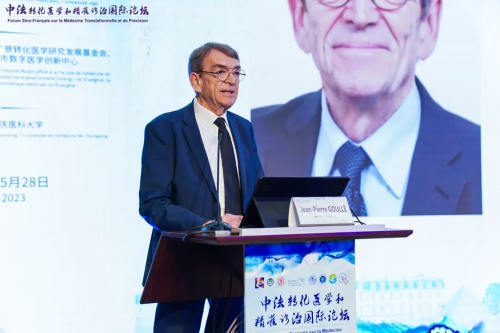
Jean-Pierre GOULLÉ, French Chairman of the Forum and President of the French National Academy of Medicine, declared that 14 Chinese members have made their contributions since the Academy's foundation in 1820 and that he was impressed by Chinese scholars’ wisdom, sincerity, and knowledge. In 2017, SJTUSM and the French National Academy of Medicine held a seminar on public health. After six years, they are joining hands again to hold this international forum. More are welcome to the Academy to promote medical cooperation between China and France.
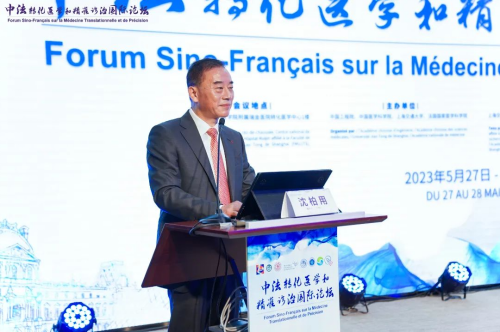
Shen Baiyong, Vice President of Ruijin Hospital affiliated to SJTUSM, presided over the opening ceremony.
The forum lasts for two days. Renowned academicians, experts and scholars in life sciences, clinical medicine and translational medicine from China and France meet and exchange thoughts on frontier topics of translational medicine, precision medicine, and life and health sciences. The Forum centers on new developments and trends in public health, cancer and aging, hematology, neurology, medical education in French, and digital smart pathology at the international level. The Forum promotes high-level academic exchanges and showcases the latest achievements. Attendees discuss core topics and share practical experiences, aiming to facilitate the vigorous development of health undertakings in China and France.

